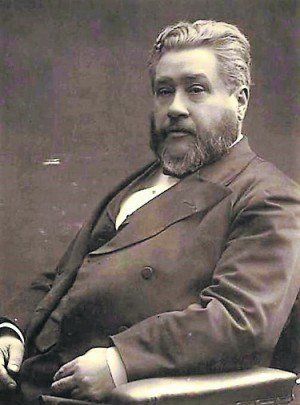Unmortified retaliation will put a person in hell. The Son of God said, ‘Ye have heard that it hath been said, An eye for an eye and a tooth for a tooth. But I say unto you, that ye resist not evil; but whosoever shall smite thee on thy right cheek, turn to him the other also’ (Matthew 5: 38-39). The religious men of Jesus’ day were pleading the law (Exodus 21:24) as a grounds for authorizing private revenge, as if God were putting the sword in every man’s hand to avenge himself. Better to suffer injury than personal retaliation, says the Lord; better to be hit on the face again and do nothing in response than revenging ourselves with fists and weapons.
Richard Weaver
Richard Weaver was the evangelist whose most successful period was in the English Midlands around 1856. The part-time pugilist began his working life as a thirteen-year-old collier. When he was first converted his fellow miners provoked him constantly. For example, at the beginning of one shift in Denton colliery one of them tried to take his coal-wagon from him, but he was not strong enough to wrench it out of his grip. Richard relates the encounter thus:
‘I’ve a good mind to smack thee on the face.’
‘Well,’ I said, ‘if that will do thee any good, thou canst do it.’ So he struck me on the face. I turned the rather cheek to him, and said, ‘Strike again.’ He struck again and again till he had struck me five times. I turned my cheek for the sixth stroke; but he turned away cursing.
I shouted after him, ‘The Lord forgive thee, for I do,’ and ‘the Lord save thee.’
That was on a Saturday and when I went home from the coal-pit my wife saw my face swollen and asked what was the matter with it. I said, ‘I’ve been fighting and I have given a man a good thrashing.’ She burst out weeping and said, ‘O Richard, what made you fight?’ Then I told her all about it and she thanked the Lord I had not struck back. But the Lord had struck and his blows have more effect than man’s.
Monday came. The devil began to tempt me, saying, ‘The other men will laugh at thee for allowing Tom to treat thee as he did no Saturday.’ I cried, ‘Get thee behind me, Satan,’ and went on my way to the coal-pit. Tom was the first man I saw. I said, ‘Good morning,’ but got no reply. He went down first. When I got down, I was surprised to see him sitting on the wagon road waiting for me. When I came to him he burst into tears and said, ‘Richard, will you forgive me for striking you?’ ‘I have forgiven thee,’ said I. ‘Ask God to forgive thee. The Lord bless thee.’
I gave him my hand and we went each to his work After a time I heard someone coming towards me, sobbing as he came. It was Tom. He said he could not rest until he felt sure he was forgiven. He told me he had sent his wife to our home to ask my forgiveness on the Sunday. But I was out.
‘O, Richard,’ he said, ‘do you really forgive me?’ I said, ‘Yes; the Lord bless thee.’ We got down on our knees. He who was wounded was graciously pleased to hear our cry and to heal; and Tom went back to his work rejoicing.

Weaver, the new Christian, was quickly learning to master his own temper. A preacher’s first duty is to take heed to himself. C. H. Spurgeon, who baptized Weaver, said, ‘We are to be as the anvil when bad men are the hammers.’ But certainly this is not a model incident and open to misinterpretation because of the way Weaver offered his face to be hit. We are not to encourage men to do wrong. J. C. Ryle pinpoints what are Christ’s prohibitions: ‘a readiness to resent injuries, a quickness in taking offence, a quarrelsome and contentious disposition, a keenness in asserting our rights, all are contrary to the mind of Christ’.
Our Lord is not telling a battered wife that she has to remain a punchbag for her husband. She may go to a refuge, or to the police, or to a solicitor. She must protect her children from abuse. The marriage may have to end. No pastor will tell a woman that she has to stay in a relationship until she is killed by her partner’s violence. Joseph was commanded by God to take his wife and child Jesus away from Herod’s violence. However, every minister must say to the victim of abuse, ‘You do not retaliate. Don’t put your hand in the drawer for the meat-knife. Better to be hit again than to seek private violent revenge for being struck on your cheek.’
Handling a gang
Joseph T. Bayly, the author of The Gospel Blimp who was executive vice-president at David C. Cook Publishing when he died in 1986, wrote of a young white couple in their mid-twenties who were living in a changing area of their city: ‘A gang of black jacketed black teenagers was the bane of the neighbourhood. They would stretch out across the street so that cars couldn’t go through. Sometimes the young couple, along with others, had to turn around and go back around the block to get to their apartment or park their car. The gang did other things equally disconcerting and obnoxious to decent law-abiding citizens.’
So what do two Christians do under those circumstances? The world would say, ‘Call the police.’ But the first response of this young couple was to pray as they read the Scriptures. They discovered they were under an obligation to ‘bless them that persecute you’ (Romans 12:14) and when they prayed for God’s blessing to come upon their young tormentors they knew that they must offer themselves as instruments of blessing. The passage in Romans went on, ‘Render to no man evil for evil,’ and then, ‘If it it be possible, as much as in you lieth, be at peace with all men.’ But then they read these words, ‘Therefore, if shine enemy hunger, feed him; if he thirst give him drink’. So what these two did in their naive obedience was to approach the gang and ask them around for a meal. Joe Bayly could report ‘And out of that evening came a weekly Bible class in that same apartment. One or two of the teenagers have become Christians so far’ (Out of my mind, Zondervan, 1993, p.88).
Responding to persecution
To control anger is a mark of spiritual maturity. A preacher must not be ‘a striker’ (1 Timothy 3:3). Timothy Fellows is the pastor of the Pilgrim’s Bible Church in Augusta, Georgia, and in a recent personal letter (21 March 1995) he wrote, ‘Last week, the dean of the pastors’ class where I teach black Baptist pastors had his church vandalized. Hymnbooks were put in the toilet and defecated upon. Liquid detergent was poured into their computer and copier. A fire extinguisher was sprayed on their carpets and pews. Portraits of the pastors over the past 122 years were drawn with horns and marred with “kkk” and “nigger”. About $15,000 in structural damage was done.
‘I was very moved with the comments of the pastor who has preached for me. When the mother of one of one of the boys came to him apologizing, and asking forgiveness from the church, the pastor refused to release her name to the press. We sent the church a cheque to encourage them in the Lord’
That is the precise Christian response, but it is not its exclusive response. Romans 12:21: ‘Overcome evil with good,’ is followed by Romans 13: 1: ‘Let every soul be subject to the governing authorities.’ Romans 13:4 is both guidance to civil authorities and God’s ordered pattern for social life: the magistrate ‘bear not the sword in vain: for he is the minister of God, a revenger to execute wrath upon him that does evil’. A Christian church must give accurate testimony to police inquiries. A Christian family may even bring out a private prosecution concerning the murder of their son. But both church and family may choose not to pursue a matter with the police. What the Christian must never do is take the course of private retaliation. Since the time of the church fathers restraint under provocation has been valued as a mark of high godliness. But much more is required of those of whom it is said ‘They can do all things through Christ who strengthens them.’
Chrysostom (who died in 407) considered praying for one’ s enemies to be ‘the very highest summit of self-control’. Chrysostom in fact developed a ladder of nine rungs beginning with a refusal to take any evil initiative. Secondly, we are not to avenge another’s evil. Thirdly, we are to be quiet, and fourthly, to suffer wrongfully. Fifthly, we are to surrender to the evildoer even more than he demands. Sixthly, we are not to hate him, but (the next two ascending rungs) to love him and do him good. And our ninth duty is ‘to entreat God himself on his behalf.

The desire for revenge
I called in at a furniture store in Louisville, a small town in Mississippi. I have known the Baptist owner for many years; his daughter is married to a Presbyterian minister named Darwin Jordan. He told me of a recent conversation he was having with a black Baptist when some obnoxious white man came walking up to them, and got involved in the conversation for a minute in order to say something unspeakable to the black Christian. My friend said, ‘You shouldn’t say a thing like that. You ought to apologize to him for saying that.’ The man stared back: ‘You won’t find me apologizing to a black epithet.’ And off he strutted. The black Christian was very hurt … so very hurt, and he said, ‘I’d like to get my revenge on him … and this would be my revenge … I would be driving back to Louisville late one night, and I would see his car on the side of the road. He would have a flat tire, and he would not have a jack in the car. I would stop my car, and get out my jack, and change his tire for him. That would be the revenge I would like to take.’
‘Be not overcome of evil, but overcome evil with good’ (Romans 12:21).This commandment will grow more urgent in the millennium ahead. The tide of cruelty and lawlessness has many currents and is increasing in force. If God should grant a great awakening then we could be the recipients of the backlash. If not, the apostolic word will be true, ‘evil men and impostors will grow worse and worse’ (2 Timothy 3:13). In the Muslim world Christians are already being hounded from place to place, subjected to physical assault, maltreatment and death of every kind. In Africa tribalism with its pitiless genocide moves through its nations. The church which is looking to its Saviour will proclaim the grace of non-retaliation, and cry mightily to God for an enabling to love its enemies, not in word only, but in deed and in truth. ‘Father, forgive them’ for they know not what they do.’
Geoff Thomas




